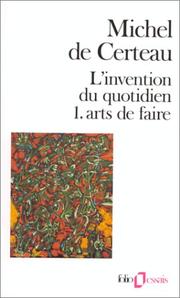| Listing 1 - 2 of 2 |
Sort by
|

ISBN: 2070325768 9782070325764 2070328279 9782070328277 Year: 2005 Volume: 146, 238 Publisher: Paris Gallimard
Abstract | Keywords | Export | Availability | Bookmark
 Loading...
Loading...Choose an application
- Reference Manager
- EndNote
- RefWorks (Direct export to RefWorks)
La Raison technicienne croit savoir comment organiser au mieux les choses et les gens, assignant à chacun une place, un rôle, des produits à consommer. Mais l'homme ordinaire se soustrait en silence à cette conformation. Il invente le quotidien grâce aux arts de faire, ruses subtiles, tactiques de résistance par lesquelles il détourne les objets et les codes, se réapproprie l'espace et l'usage à sa façon. Tours et traverses, manières de faire des coups, astuces de chasseurs, mobilités, mises en récit et trouvailles de mots, mille pratiques inventives prouvent, à qui sait les voir, que la foule sans qualité n'est pas obéissante et passive, mais pratique l'écart dans l'usage des produits imposés, dans une liberté buissonnière par laquelle chacun tâche de vivre au mieux l'ordre social et la violence des choses.Michel de Certeau, le premier, restitua les ruses anonymes des arts de faire, cet art de vivre la société de consommation. Vite devenues classiques, ses analyses pionnières ont inspiré historiens, philosophes et sociologues.
cultuurfilosofie --- consumptiemaatschappij --- etnografie --- stedelijkheid --- openbare ruimte --- taal --- taalfilosofie --- religie --- dood --- Comportement humain --- Perception de l'espace --- Consumers --- Creativity. --- Cuisine --- Espace privé --- Espace social --- Quartier --- Lyon --- Quartier la croix-rousse (lyon) --- -#VCV monografie 1999 --- wijken --- buurtwinkels --- wonen --- koken --- kookkunst --- sociologie --- winkels --- brood --- wijn --- restaurants --- 130.2 --- History of civilization --- Philosophy and psychology of culture --- #VCV monografie 1999 --- Social history --- Descriptive sociology --- Social conditions --- History --- Sociology --- Addresses, essays, lectures --- Human behavior --- Histoire sociale --- Ecriture --- Espace urbain --- Langage --- Littérature --- Philosophie --- Psychologie --- Religion --- Sociologie --- Sociologie de l'habitat --- Social ecology --- Culture --- Philosophy --- Social evolution --- Habitat --- Social history. --- Communication and culture. --- Social aspects. --- Espace --- Histoire --- Idéologie --- Mort --- Politique --- Théorie de l'urbanisme --- Bourdieu, Pierre, --- Detienne, Marcel --- Foucault, Michel, --- Freud, Sigmund --- Kant, Emmanuel --- Wittgenstein, Ludwig Josef --- Culture - Philosophy --- Bourdieu, Pierre, 1930-2002 --- Foucault, Michel, 1926-1984 --- Aliment (thème) --- Sociologie du quotidien --- Sociologie de la culture --- Culture de masse --- Civilisation moderne --- Sociologie du quotidien --- Alimentation --- Habitudes alimentaires --- 1950 --- -Histoire --- France --- Aspect social --- 19e-20e siècles --- SOCIOLOGIE --- CIVILISATION MODERNE --- LANGAGE ET LANGUES --- PSYCHANALYSE --- HISTOIRE --- -PHILOSOPHIE --- ASPECT SOCIAL --- -Addresses, essays, lectures --- Philosophie du langage --- -PSYCHANALYSE
Book
ISBN: 022620927X Year: 2015 Publisher: Chicago : University of Chicago Press,
Abstract | Keywords | Export | Availability | Bookmark
 Loading...
Loading...Choose an application
- Reference Manager
- EndNote
- RefWorks (Direct export to RefWorks)
More than two decades have passed since Chicago published the first volume of this groundbreaking work in the Religion and Postmodernism series. It quickly became influential across a wide range of disciplines and helped to make the tools of poststructuralist thought available to religious studies and theology, especially in the areas of late medieval and early modern mysticism. Though the second volume remained in fragments at the time of his death, Michel de Certeau had the foresight to leave his literary executor detailed instructions for its completion, which formed the basis for the present work. Together, both volumes solidify Certeau's place as a touchstone of twentieth-century literature and philosophy, and continue his exploration of the paradoxes of historiography; the construction of social reality through practice, testimony, and belief; the theorization of speech in angelology and glossolalia; and the interplay of prose and poetry in discourses of the ineffable. This book will be of vital interest to scholars in religious studies, theology, philosophy, history, and literature.
Mysticism --- Mysticism --- History --- History --- historiography, social reality, mysticism, 16th century, 17th, religion, theology, history, testimony, belief, angelology, speech, glossolalia, prose, poetry, ineffable, nonfiction, philosophy, literature, nicholas of cusa, europe, silence, discourse, all seeing eye, knowledge, power, control, surveillance, individual, identity, fragment, melody, john cross, saint, holiness, graces, surin, spirituality, noise, madness, insanity, voice, richard simon, pascal, angels, saussure, language, communication, meaning, chiaroscuros.
| Listing 1 - 2 of 2 |
Sort by
|

 Search
Search Feedback
Feedback About UniCat
About UniCat  Help
Help News
News